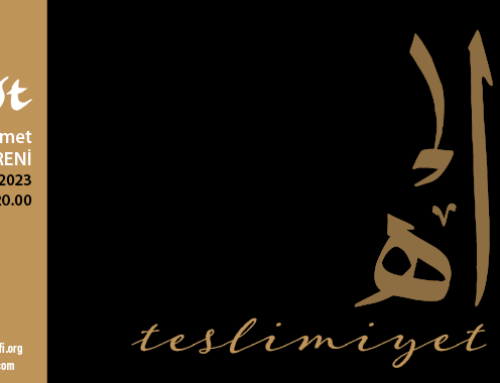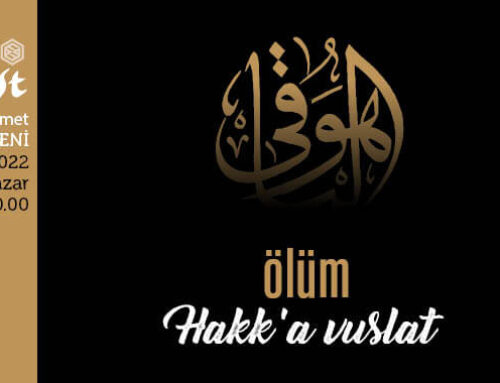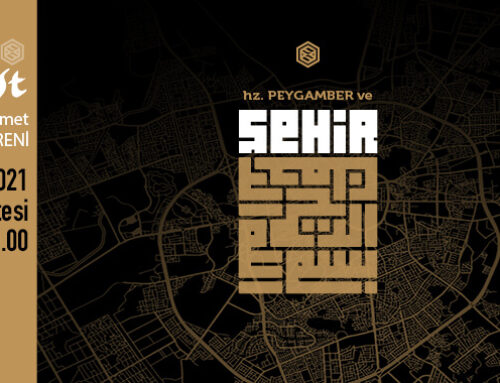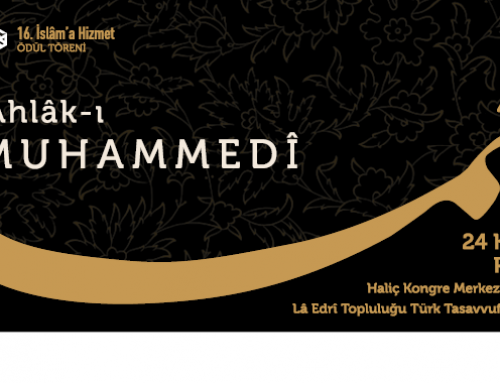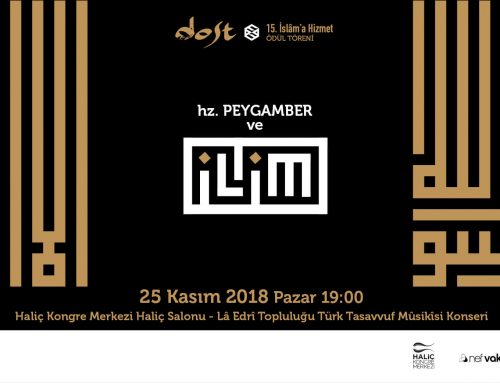Project Description
“Conquest” Title 17. DOST Awards for Service to Islam Presentation Ceremony
The 17th DOST Service to Islam Awards presentation ceremony titled “Conquest” will be held ONLINE on Sunday, November 08.
The Prophet, who was sent as a mercy to the worlds. The “DOST” Service to Islam Awards , which are given annually to commemorate the anniversary of the birth of Prophet Muhammad (PBUH) and his love that unites everyone under the banner of Tawhid, will be presentedon Sunday, November 08at a ceremony to be held online at .
“Conquest”
will be presented at a night to be organized under the title
17th “DOST” Awards for Service to Islam
Haluk Dursun from Turkey and Suad al-Hakîm from abroad.
DATE OF AWARD CEREMONY: Sunday, November 08, 2020, Time: 20:00
Sponsors of the Night
Nefes Publishing
and
Tuti Book
Participation is free and open to all.
***17th DOST – Service to Islam Awards Presentation Night live broadcast is organized by Nefes Publishing House Inc.
17th DOST Service to Islam Awards Video Album
17th DOST Service to Islam Awards Photo Album
Education, University, Consultancy and Presidential Duties
Born in 1957 in Hereke. After graduating from Galatasaray High School, he started his academic life as an assistant at Marmara University Atatürk Faculty of Education after graduating from Istanbul University Faculty of Literature, Chair of History of the Late Modern Age and the Republic of Turkey. He completed his master’s and doctorate degrees at Marmara University in the Department of Modern History. Haluk Dursun, who is an associate professor of history in the field of “History of Ottoman Institutions and Civilization”, received the title of professor in the Department of Modern History at Marmara University Faculty of Arts and Sciences.
Dursun, who has important activities in the public sphere in addition to his academic studies, took part in the preparation of the Miniatürk Project as the Advisor to the General Manager of IBB Kültür A.Ş. Appointed as a member of the Board of Directors of the Turkish Touring and Automobile Association by the Ministry of Interior, Dursun served as the Vice President of the same organization in 2005-2006 and 2011. In 2007, he served as the acting Director of Istanbul Provincial Directorate of Culture and Tourism and as the Director of the Hagia Sophia Museum between 2006 and 2012, and he also served as the Director of the Hagia Sophia Museum between 2009 and 2011.
In July 2012, Haluk Dursun was appointed as the Director of the Topkapı Palace Museum, a position he held until 2014. During his directorship, sections closed to visitors were opened, temporary exhibitions were organized, “Palace Lectures” were organized in Topkapı Palace, traditional Ramadan events and Muharram ashura programs, baklava processions, and music programs were organized in the Department of Sacred Relics, and palace traditions were kept alive within the scope of “living museum” activities.
Haluk Dursun also served as the Chairman of the Board of Directors of the Istanbul Topkapı Palace Lovers Association in 2013. Dursun also organized many events and organizations during his tenure at the Hagia Sophia and Topkapı Palace Museums, and focused on activities that highlighted the cultural and historical texture of historical buildings.
He served as the Chairman of the Board of Directors of Yunus Emre Institute and a natural member of the Board of Trustees of the Turkish Culture Service Foundation, taught “National Security” at the Police Academy, prepared the “City of Human” project, and gave numerous conferences in Turkey and abroad.
Haluk Dursun was appointed Undersecretary of the Ministry of Culture and Tourism in July 2014 and retired in April 2016.
In 2017, he was appointed as a member of the Ethics Board of Public Officials of the Republic of Turkey Prime Ministry with the Decree of the Council of Ministers. He also served as a member of the Board of Directors of the Atatürk Culture, Language and History Institute.
Haluk Dursun was appointed as Deputy Minister of Culture and Tourism of the Republic of Turkey on July 20, 2018. While returning from his beloved Ahlat, he had a traffic accident between Adilcevaz and Erciş and died on the spot.
Special Projects and Awards
Haluk Dursun won the Istanbul Chamber of Architects’ “Expertise in the Press Award” in 1989 for a series of articles he wrote titled “Farewell Bosphorus”. Again in 2002, he received the “Travel Writers Award” from the Writers’ Union of Turkey for his book ” From the Nile to the Danube “. During Haluk Dursun’s presidency, the Hagia Sophia underwent important restorations, conservation/repair works on the Ottoman artifacts in and around the museum were completed, and the tombs of Ottoman sultans in the Hagia Sophia were opened to visitors as a “Museum of the Culture of Death” in his own words. These works at Hagia Sophia earned Haluk Dursun, the head of the museum, the Rotondi Award for the Savior of Art (Premio Rotondi 2010 ai Salvatori Dell), given annually in Italy in 2010. At the same time, Haluk Dursun won the “Event Award” given within the scope of the 2011 Istanbul Tourism Awards for the events he organized on Hagia Sophia, his Hagia Sophia travel conferences, his work on explaining the Hagia Sophia Museum to children at the Sıbyan School, his re-launch of the “Museum Magazine” which had not been published for 17 years, his Golden Horn and Bosphorus presentations, and his various works in the field of Istanbul-based cultural historiography. He prepared and conducted the “City-Human Bridge of Civilization: Exemplary Personalities Project” and edited the book “Five City People on the Bridge of Civilization” prepared within this scope.
Haluk Dursun, who carried out various studies on structuring and coordination in the establishment of the “Çanakkale and Gallipoli Historical Site Presidency”, organized programs for secondary school students under the title of “Anatolian History and Culture Union” in Sivas, Amasya, Samsun, Mardin, Erzurum and Ankara in cooperation with the Turkish Historical Society in his last position as Deputy Minister of the Ministry of Culture and Tourism, and worked to bring together young people living in different regions.
Haluk Dursun was also awarded the Halil İnalcık History Award by the Seljuk Foundation 2019 after his death, and the Vefa Award given within the scope of the Presidential Culture and Art Grand Awards 2019.
Cultural History Conferences, Programs and Books
In addition to courses such as Atatürk’s Principles and Revolutions, Byzantine and Western European History, Modern and Contemporary European History, History of Ottoman Institutions and Civilization, History of Turkish Culture, Historical Places of Istanbul, Education and Cultural Policies of the Republican Era, The Role of Museums in History Teaching, he has given numerous lectures, interviews, seminars, especially on the history, architecture, culture and art of Istanbul, and has actively participated in many activities and projects in this field. For many years, he has organized Bosphorus Excursions for countless institutions and organizations based on the culture and history of the Bosphorus. Haluk Dursun organized radio programs in various periods, wrote culture and art articles in various newspapers, and prepared and presented history, culture and art programs on television. Within this framework, he prepared and presented the program “History Space” broadcast on TRT 2 since September 2005, and was the consultant for the documentaries “Jerusalem”, “Evliya Çelebi on the Pilgrimage”, “Tuna” and “Mimar Sinan: The Architect” on Ottoman cultural geography. He presented the 2010 documentary ‘Istanbul’u Yaşamak’ on TRT Türk and participated in the program ‘İncir Çekirdeği’ on KANAL 24 with Prof. Dr. İskender Pala. He took part in the preparation and presentation of the program ‘Mongolia – In the Shadow of Orkhon’, which was broadcast in 2012. He made the history and culture programs “Acaba” with Levent Erden and Prof. Dr. Gül İrepoğlu on NTV and “Sarayın Sırları” with Levent Erden on the same channel.
Between 2017-2019, Haluk Dursun gave seminars, talks and conferences mainly titled “Alone with Young People” at various cultural centers and schools.
Haluk Dursun’s works :
- The Art of Living in Istanbul
- Ottoman Writings from the Nile to the Danube
- Danube Beauty
- Journey to the Ottoman Geography
- Forty Years in Bosphorus
- Hagia Sophia Museum Culture Inventory
- City and Culture: Istanbul
- Fig Kernel On My Way from Hereke
- Bridge of Civilization Five Cities
- Haluk’s Notebook: Life Science with Young People
- Born on March 27, 1946 in Beirut.
- She is married to Dr. Hassan Sharaf al-Din, who holds a PhD in Accountancy and is a Professor of Accountancy and Taxation at the Lebanese University and Islamic University.
- Children: Judge Rima, Dr. Rana, Dr. Nadin, Tala and Mohammed Omar.
Education
- – She completed her primary and secondary education for the first two years at the Man-i Dawud-i School, followed by 3 years at Islamic Goals (Khadija al-Kubra) and Raml Zeydani Girls’ School, where she received her primary (certificate) and secondary certificates.
- Hassan joined the “Teachers’ House” in Kuyu and during his studies he obtained two high school completion degrees in 1964 in the first and second divisions.
- Bachelor of Philosophy, Lebanese University, Faculty of Arts and Human Sciences, 1968 – 1969.
- Master’s Degree in Philosophy, Saint Joseph University, 1973.
- PhD in Islamic philosophy of the state, University of Saint Joseph, 1977.
Academic career and experiences:
- Founder of Dandara Education Center.
- April,2007 – April, Dean of the Graduate Institute of Literature, Humanities and Social Sciences of the Lebanese University.
- Since 2000 and until today, Professor of Sufi Studies and Islamic Philosophy at the Institute of Oriental Literature and the Institute of Religious Studies at Saint Joseph University (SJU) Beirut.
- 1978 – 2010. I did higher education (with the rank of lecturer). Lebanese University, Faculty of Arts and Human Sciences, Department of Philosophy.
- 1996 – 2002 and 2013 – present, lecturer on Sufism and Sufi orders, Higher Institute of Islamic Studies, Al-Maqasid, Beirut.
- 1998-1999 Member of the Scientific Council of the Lebanese University.
- 1998 – 1999, Member of the Supreme National Committee of UNESCO in Beirut.
- 1993-1998, Lebanese University, Faculty of Literature and Humanities, Head of Philosophy Department.
- 1997, I joined the new curriculum committee on “Philosophy and Civilizations”, the Center for Educational Research and Development, and participated in the writing of the textbook for the same subject.
- 1973-1978: Chairman of the Lebanese University Faculty of Law.
- 1964-1973, taught in Lebanese public primary schools.
Cultural centers and associations:
- El-denderawi Family House , head of the “Dandara Cultural Center” located in Corniche Al Mazraa, Beirut.
- Member of the Board of Directors of the Lebanese Philosophical Society and Secretary of Arab Public Relations.
- Headquarters: Faculty of Religious Studies, Human Sciences Campus, Saint Joseph University, Beirut, founding member of the Gladic Reconciliation Association (Lebanese Friendship Meeting for Christian-Islamic Dialogue).
- Academic advisor and board member of “wake” (Mohamed Dimashkiiye Cultural Center) Association, Beirut.
Awards Received:
- The “translator” prize was awarded on March 9, 2013 by MIAS LATINA – SPAIN in Spain for his work on the great teacher Mohiuddin Ibn Arabi.
- On March 15, 2013, as part of the program honoring cultural figures in Lebanon and the Arab world, an honorary award for the cultural movement in Antelias.
- Honorable mention at the Festival of Sufi Culture in Fez, from 12 to 19 April 2014, eighth session and title of the festival: “Following in the footsteps of Ibn ‘Arabi” (the honoring was on April 13).
Published books:
- Sufi Dictionary [kelimenin sınırları içindeki bilgelik], Dandara Research Foundation, Beirut 1981.
- Israa to the Prisoner Place, by Ibn Arabi, [inceleme ve sunum] Dandara Research Foundation, Beirut 1988.
- Ibn Arabi and the Birth of a New Language, Dandara Educational Foundation, Beirut, 1991.
- The Return of Al-Wasil, Dandara Research Foundation, Beirut 1994.
- Scenes of the sacred mysteries and the reading of the divine lights by Ibn Arabi [Review and translation into Spanish], University of Murcia publications 1996. [Dr. Pablo Benito].
- Abu Al-Ala Al-Maari, Between the Sea of Poetry and the Land of the People, Lebanese House of Thought, Beirut, 2003.
- Taj Al-Arifin, Al-Junaid Al-Baghdadi, The Complete Works, Dar Al-Shorouk, Egypt, 2004.
- Revival of the science of religion in the twenty-first century, rewriting the encyclopedia of al-Ghazali, Revival of the Revival of Religious Sciences, Dar Al-Shorouk, Egypt, 2004. Excerpts from this book have been translated into English:
- Writing and the Creativity of Writing Creativity, An Eye for an Eye … A Contemporary Commentary on Abd al-Karim al-Jaili’s poem known as Ayniyyah, Dar Al-Buraq, Beirut, 2004.
- Explanation of the secret scenes of the six Ajam girls Al-Nafees Al-Baghdadia, Damascus, French Institute, 2004, [Dr. Bakri Alaa Eldin].
- Echoes of the White Paper, The White Paper, Book One: Genesis and Being, 2006. It is a book introducing the Dandarawi family. Dar Al Buraq in Beirut and the Al Sharq Library in Paris.
- Women, Sufism and Life, Kanz Publishers, Lebanon, first edition 2017.
- Al-Muwatta fi al-ilm al-makarim al-morhal, in the encyclopedia “Noble Science of Ethics between theory and practice – creating a new Islamic science”, (18 volumes)


























































